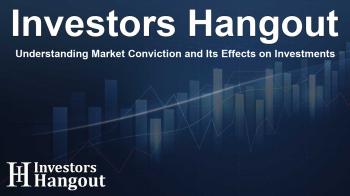Understanding Market Conviction and Its Effects on Investments

Understanding Market Sentiment and Investor Conviction
Market conviction plays a crucial role in shaping investor behavior. Edward Harrison of Bloomberg highlighted an important truth: “buying stuff you don’t believe in creates downside risk.” This statement encapsulates the idea that conviction reflects how much faith investors have in their investments. When confidence is high, investors are more inclined to endure temporary price drops, often choosing to buy more. In contrast, a lack of conviction can drive investors to sell at the slightest hint of a downturn, which presents a unique risk in today’s fluctuating market.
Recent data indicates that a significant 91% of fund managers view the US equity markets as overvalued. Despite this perception, their investment levels remain high, with cash balances at near record lows. This scenario reveals a paradox: institutional investors are heavily invested but lack the conviction in their holdings, leaving them vulnerable, particularly in times of market stress.
Recent Market Volatility and Its Implications
The volatility of the market was starkly illustrated during the recent downturn in April, triggered by sudden tariff announcements. Harrison’s insights suggest that this episode showcases the fragility of the current market. Any unexpected policy change could easily shatter investor confidence and lead to a broader market decline. This has heightened concerns about how prepared investors are for potential economic shocks.
Retail Investor Dynamics
Interestingly, while institutional buyers are skittish, retail investors are displaying robust conviction in the market. Their resolve has contributed to a remarkable V-shaped recovery following the April lows. This leads us to question the traditional wisdom that categorizes Wall Street as the “smart money” and Main Street as the “dumb money.” Perhaps we are witnessing a shift in market dynamics where retail investors have a clearer understanding of the trends.
Inflation Effects on Economic Indicators
A recent report from the PPI significantly surprised many, indicating an increase of 0.9% for July, starkly outperforming expectations of +0.3%. Despite this, the stock and bond markets exhibited little reaction, and probabilities of interest rate cuts remained over 90%. Such inflation signals tend to evoke caution, yet the market seems to exhibit resilience in the face of these reports.
The Role of Services in Inflation Metrics
A key driver behind these rising prices is attributed to the services sector, accounting for one-third of overall increases. Trade services, acting as a proxy for retailer and wholesaler profit margins, contribute significantly to the volatility in this area. For example, if a supermarket raises the price of water from $1.00 to $1.01, despite a mere 1% increase, the profit margin can jump by 10%. This volatility may lead markets to overlook some of the fluctuations, at least temporarily, while they adapt.
Looking Ahead: Potential Market Scenarios
The current state of the market underscores a crucial point: the blend of conviction and risk. As we navigate potential economic uncertainties, both retail and institutional investors must assess their positions and the broader market landscape carefully. The ability to remain calm amid volatility and maintain a conviction in one’s investments will likely define successful strategies moving forward.
Frequently Asked Questions
What is market conviction?
Market conviction refers to the level of belief an investor has in their investments, influencing their willingness to hold during downturns.
How does investor conviction impact market behavior?
A lack of conviction often causes investors to sell quickly, exacerbating market declines, while high conviction can lead to increased buying during dips.
What recent events have affected market conviction?
Recent economic data revealing overvalued markets and inflation reports have significantly impacted investor sentiment and conviction levels.
How do retail investors differ from institutional investors?
Retail investors have shown stronger conviction recently, contrasting with institutional managers who may hesitate due to market valuations.
What are the implications of inflation on investment strategies?
Inflation can lead to altered investment approaches, as both retail and institutional investors reassess their strategies in response to rising prices.
About The Author
Contact Caleb Price privately here. Or send an email with ATTN: Caleb Price as the subject to contact@investorshangout.com.
About Investors Hangout
Investors Hangout is a leading online stock forum for financial discussion and learning, offering a wide range of free tools and resources. It draws in traders of all levels, who exchange market knowledge, investigate trading tactics, and keep an eye on industry developments in real time. Featuring financial articles, stock message boards, quotes, charts, company profiles, and live news updates. Through cooperative learning and a wealth of informational resources, it helps users from novices creating their first portfolios to experts honing their techniques. Join Investors Hangout today: https://investorshangout.com/
The content of this article is based on factual, publicly available information and does not represent legal, financial, or investment advice. Investors Hangout does not offer financial advice, and the author is not a licensed financial advisor. Consult a qualified advisor before making any financial or investment decisions based on this article. This article should not be considered advice to purchase, sell, or hold any securities or other investments. If any of the material provided here is inaccurate, please contact us for corrections.

